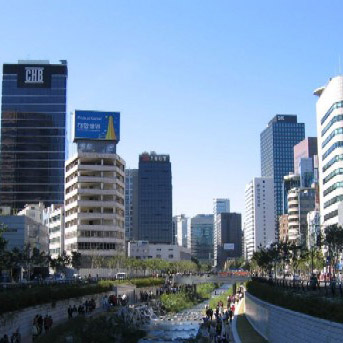South Korea and Uzbekistan pledged Thursday to work together to ensure a smooth implementation of large-scale joint projects, including one calling for building a massive gas-chemical plant in the Central Asian nation, a joint statement said, Yonhap reported.
South Korean President Lee Myung-bak and Uzbekistan's President Islam Karimov reached the agreement during summit talks in Seoul, sharing an understanding that enhancing economic cooperation is key to moving overall relations forward, the statement said.
Karimov arrived in Seoul on Wednesday for a three-day state visit.
This year marks the 20th anniversary of diplomatic relations between the two countries. Lee has held summit talks with Karimov every year since taking office in early 2008, and Thursday's summit was their sixth. Officials said the two leaders have developed a close friendship.
"So far, I visited South Korea six times, and this is my seventh. There is no country I have visited as often as this," Karimov said during a one-on-one summit, recalling his 2006 visit during which he received honorary Seoul citizenship from Lee, the then mayor, according to presidential spokeswoman Lee Mi-yon.
During Lee's trip to Uzbekistan last year, the two countries signed a package of deals to develop the Surgil gas field near the Aral Sea and build a gas-chemical plant, the largest-ever contract between South Korea and Uzbekistan since they forged diplomatic relations.
On Thursday, the two sides expressed satisfaction with the progress in the US$4.1 billion project and reaffirmed their commitment to provide maximum support for its success, according to the statement.
Lee and Karimov also agreed to continue close cooperation in Uzbekistan's ambitious plan to turn its Navoi airport in the southwestern part of the country into a regional logistics hub and create a free industrial and economic zone there, the statement said.
Uzbekistan also asked for South Korea's participation in a project to create a special industrial zone in Angren near the capital Tashkent that will offer tax breaks and other benefits to attract investments from home and abroad.
In particular, Lee touted the Navoi project as "future-oriented and insightful."
"I understand this is currently progressing smoothly. As this is beneficial to both Uzbekistan and our country, I hope we will keep this going well," Lee told Karimov, according to the spokeswoman.
Karimov praised South Korea as "trustworthy" and said he hopes to see close cooperation between the two countries go beyond oil and gas development and expand to such areas as information technology and electronic government.
He also expressed hope to invite a South Korean IT expert as a vice-minister level official.
South Korea expressed its willingness to provide financing and technological support for education, healthcare, communication technology, agriculture and other socially important projects in Uzbekistan, the joint statement said.
The two countries also agreed on the need for expanding and diversifying aid projects in Uzbekistan, and South Korea agreed to use its Economic Development Cooperation Fund and other means to help with information technology, energy, transportation infrastructure and other projects in Uzbekistan, it said.
They also agreed to strengthen cooperation within the framework of the United Nations and other international organizations and work together to cope with global and regional challenges and promote peace and stability, the statement said.
Uzbekistan also expressed support for Seoul's policy on North Korea, it said.
On the sidelines of the summit, the two countries signed four agreements calling for judicial cooperation, protection of classified military information, tourism promotion and financial cooperation.






